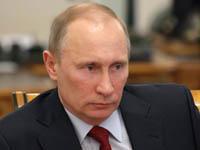Putin signs new law about violations at mass meetings
Russian President Vladimir Putin signed the Federal Law "About the introduction of amendments in the Code of the Russian Federation on administrative violations and the Federal Law "About meetings, demonstrations, gatherings, marches and pickets."

The draft law about the organization of such public events triggered quite a discussion in Russia. It would be enough to say that it took deputies nearly 12 hours to discuss the amendments to the draft law during the second and third reading.
The supporters of the new law stated that Russia would finally be able to bring the laws about mass meetings and the responsibility of their participants and organizers in accordance with the norms of developed democratic states. The adversaries of the new law claim said that the necessity to impose tough regulations on such public events, meetings and demonstrations was against the Constitution. They did not explain, though, why the individuals, who publicly incite others to committing illegal actions, were sentenced to ridiculous fines (1,000 rubles or $30). However, the damage that can be caused with such actions can be evaluated at millions of rubles, not to mention the damage caused to the health of other people.
State Duma deputies and the members of the Federation Council approved the new draft law. Opposition activists switched their attention to the president immediately.
Sergei Mironov, the leader of Just Russia, the head of the Moscow Helsinki Group Lyudmila Alekseyeva and the chairman of the presidential Council for Human Rights, Mikhail Fedotov, sent a letter to Putin with a request to delay the signing of the law.
Natalia Narochnitskaya, the President of the Historical Prospect Fund, told Pravda.Ru that many countries practice very tough measures to regulate people's behavior during mass meetings. "If you say beforehand that the new law would deprive people of their right for meetings and demonstrations, that would be quite an incorrect thing to say. Any public phenomenon that occurs on a regular basis has to be regulated legally. We haven't had this law before, which may explain the concerns that some people have at this point. Now one would have to read the law before climbing a lamppost to urge other people to storm the Kremlin," the specialist said.
Georgy Fyodorov, the President of the Center for Social and Political Research, stated that only the Constitutional Court of the Russian Federation could decide whether something was contradicting to the Constitution or not. "It was not up to the Council for Human Rights to decide that. The council is just an advisory body," he stated.
As for Vladimir Putin, his press secretary Dmitry Peskov said that President Putin would hold objections against the law "only if the law contradicts to commonly recognized and international practices that give people an opportunity to realize their rights." Putin did not have any objections against the law, though.
The president said that he signed the law and analyzed the materials, which the State Duma had sent him. "Comparing the law to similar laws of other European countries - Germany, Italy, Spain, the UK, France - and judging upon those materials, I can say that our law does not have a regulation that would be tougher than the measures stipulated by similar laws in the countries that I mentioned," Putin said.
Putin added that the law could be amended further on even though it had been signed. "Nothing is frozen here. If we find out that deputies missed something out of their attention, then we can ask them to change it, if there is a need in that, of course," Putin said.
The Federal Law "On Amendments to the Code of the Russian Federation on Administrative Violations," and the Federal Law "On Assemblies, Rallies, Demonstrations, Processions and Pickets" was adopted in order to strengthen the administrative responsibility for violations of the law on meetings, rallies, demonstrations, processions and pickets, and to clarify the reasons and the aggravating circumstances in the prosecution of violations in this area.
Article 1 of the Federal Act amended the following to the Code of the Russian Federation on Administrative Violations: List of Part 1 of Article 3.2, "Types of administrative penalties," added a new punishment in the form of compulsory labor;
Part 1 of Article 3.3, "Basic and additional administrative penalties" required work assigned to the main types of administrative penalties;
Part 1 of Article 3.5, "Administrative penalty" maximum size of an administrative fine for the citizens on the sanctions of Articles 5.38, 20.2, 20.22, 2018, Part 4 of Article 20.25 increased to three hundred thousand rubles ($10,000), and for officials of the sanctions of Article 5.38, parts 1 - 4 of Article 20.2, Articles 20.22, 20.18 - up to six hundred thousand rubles ($20,000);
Chapter 3 was supplemented with Article 3.13 "Compulsory Labor";
In Part 1 of Article 4.5 of the "Statute of limitations for bringing to administrative responsibility" violations of the law on meetings, rallies, demonstrations, processions and pickets are classified as cases, in which the statute of limitations is one year from the date of committing the administrative offense;
Article 6 of the "Members of the public event," was supplemented by a new Part 4, which provides that members of public events shall not: hide their faces with masks and other items that may complicate the identification of individuals, carry weapons or weapon-imitating items, explosive and flammable substances; drink alcoholic beverages; be in the place of public assembly in a state of intoxication.
Article 7 of the "Notice of public event," was added with part 11 to permit a single picket, without notice, and specifying requirements for its implementation.
Article 9 of the "Time of the public event" changes the time to end the event from 11 p.m. to 10 p.m., local time.
Lev Pravin
Pravda.Ru
Subscribe to Pravda.Ru Telegram channel, Facebook, RSS!


